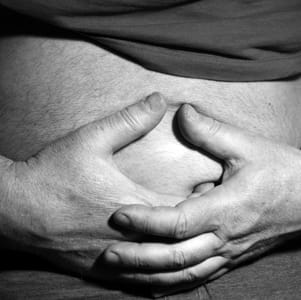
BACKGROUND: A 46-year-old self-employed plumber – Mr H – attends the surgery complaining of recurrent indigestion and heartburn. He is moderately obese and has recently separated from his wife. The GP – Dr F – notes that the patient had seen another GP in the practice two months before in regard to stress and depression connected with the marriage break-up.
Dr F examines the patient and notes a minimally tender epigastrium (no upper quadrant pain) with a clear chest. The diagnosis is heartburn and Mr H is prescribed omeprazole and provided with dietary advice. The patient is advised to re-attend if the symptoms do not improve.
Four months later Mr H is back at the surgery and this time is seen by Dr K. He complains of recurrent epigastric pain and reports that the omeprazole supplemented with over-the-counter antacids have not helped. Mr H wonders if it might be gallstones as his sister had similar symptoms with her gallstones.
Dr K decides that based on the history alone it sounds like dyspepsia. He prescribes ranitidine and asks Mr H to return in four weeks for review.
Six weeks later Mr H returns to the practice and is seen by Dr F. He complains again of epigastric pain and says it has grown worse. Neither the omeprazole nor the ranitidine have helped and he is still worried it might be gallstones. Dr F prescribes Peptac and arranges for an ultrasound investigation.
The ultrasound reveals a thin-walled gallbladder containing several calculi though a normal common bile duct. A private referral to a general surgeon is made and Mr H undergoes a laparoscopic cholecystectomy. His recovery is uneventful and histology of the gallbladder confirms chronic cholecystitis.
A letter of claim is later received by the practice alleging clinical negligence against Dr K in the delayed diagnosis of the patient’s gallstones. Mr H claims this led to unnecessary prolonged pain and missed work.
ANALYSIS/OUTCOME: MDDUS reviews all records associated with the case and instructs a GP expert. The letter of claim alleges that Mr H presented to Dr K with epigastric pain having been previously prescribed omeprazole without any benefit. The patient expressed worry that he might have gallstones but Dr K diagnosed dyspepsia without an examination to determine the nature of the epigastric pain – leading to a failure to arrange a timely ultrasound investigation.
The GP expert agrees that the failure by Dr K to examine the patient constitutes a breach of duty of care. On the question of the likely findings had Dr K examined the patient, an expert general surgeon opines that it is likely that tenderness would have been elicited over the gallbladder in that consultation, leading to referral for an ultrasound scan. He concludes that causation (the consequences of the breach) is limited to two months of additional pain and missed work.
MDDUS considers the case represents a clear litigation risk and with the agreement of the member offers a small settlement with no admission of liability.
KEY POINTS
- Do not rely on notes from previous examinations in considering a diagnosis – re-examine the patient.
- Always carry out an adequate history/examination to determine the nature of reported pain.
- Record the justification behind key clinical decisions.
This page was correct at the time of publication. Any guidance is intended as general guidance for members only. If you are a member and need specific advice relating to your own circumstances, please contact one of our advisers.
Save this article
Save this article to a list of favourite articles which members can access in their account.
Save to library
